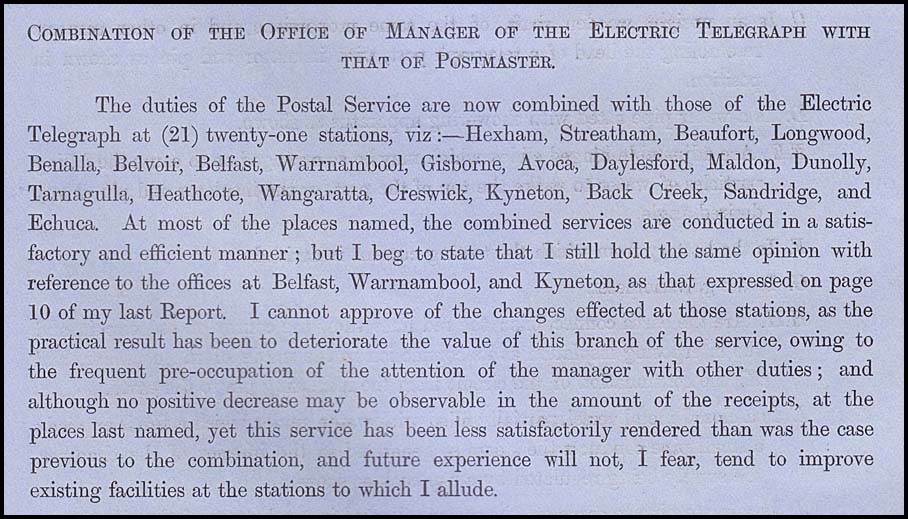The Legislation for and the administration of the telegraphic service.
- Home, index, site details
- Australia 1901-1988
- New South Wales
- Overview of NSW
- Telegraph lines
- Telegraph Offices
- Date stamps
- Forms
- Envelopes
- Rates
- Stamps
- Queensland
- Overview of Qld
- Telegraph lines
- Telegraph offices
- Date stamps
- Forms
- Envelopes
- Rates
- Stamps
- South Australia
- Overview of SA
- Telegraph lines
- Telegraph Offices
- Date stamps
- Forms
- Envelopes
- Rates
- Stamps
- Tasmania
- Overview of Tasmania
- General developments
- Reports
- Organisation
- Telegraph lines
- Telegraph Offices
- Date stamps
- Railway lines
- Forms
- Envelopes
- Rates
- Stamps
- Overview of Tasmania
- Victoria
- Overview of Vic.
- Telegraph lines
- Telegraph offices
- Date stamps
- Forms
- Envelopes
- Rates
- Stamps
- Ephemera
- Western Australia
- Overview of WA
- Telegraph lines
- Telegraph Offices
- Date stamps
- Forms
- Envelopes
- Rates
- Stamps
This page summarises the main aspects of:
- the Legislation passed in Victoria relevant to the operation of Telegraphic communications;
- the main developments with respect to the administration of the Telegraph Branch;
- the Reports included in this website related to the operation of the Victorian Telegraphic services.
On 8 April 1854, the Electric Telegraph Bill which was the first telegraph legislation was introduced into the Legislative Council of Victoria. It was based on the 1846 Telegraph Act of Canada. The Council was informed that the legislation had received Royal assent on 11 April 1854.
In the Legislative Assembly of 27 January 1860, Mr Caldwell gave notice that he would, on Thursday next, move for the appointment of a select committee to enquire into the management of the department of the Electric Telegraph.
In February 1869, it was announced that the Victorian Government had resolved upon combining the Postal and the Electric Telegraph Departments, so far as the administrative portion of the duties connected with them is concerned. In consequence of this change, the services of Mr. McGowan and of the chief accountant would be no longer required. Mr. McGowan was therefore made one of the Inspectors of country Post Offices.
Administration of the combined Department.
No-one served as Postmaster-General from September 1869 to June 1872 when Edward Langton was appointed - well after the merger of the two Departments. He served until July 1874.
The Geelong Advertiser of 5 June 1874 commented as follows on the amalgamation and the personnel involved:
The Melbourne correspondent of the Star writes: "In leaving the departmental control of the Post and Telegraph Offices, Mr Langton has given, it seems, a certificate of character to the Deputy Postmaster-General, Mr Turner. This is very amusing, not because the act is unprecedented, but because if any department in the whole public service is woefully mis-managed it is that of the Post and Telegraphs. Had Mr Langton remained in office a month longer, this would have been forcibly proved to him. As it is, his successor will have speedily to set his house in order, or it will go hard with him. Mr. Turner, it is notorious, holds control of the Telegraph-office, simply as a means of making it sabserve the interests of the Post Office, over which he presides, and greatly therefore to the detriment of public interests. Colonel Robinson, Director of the Indian Telegraphs, points out in a late report that wherever this amalgamation had taken place the most disastrous results had happened to the telegraph service, and that in England the early divorce of the two services was contemplated. More recently Mr Cracknell, in Queensland, reported to his Government that in places where the Post and Telegraph Departments were worked together, the dual system had proved to be neither economical nor efficient, and he requested a speedy separation. It is simply necessary to say that in this colony, so long as telegraphs remain under Mr Turner, the Deputy Postmaster-General, a gentleman having not the very slightest technical acquaintance with the duties of his position, the service is bound to deteriorate, Mr Langton's certificate notwithstanding."Robert Ramsey served as Postmaster-General from July 1874 to August 1875.
Mr. W. Turner was Deputy Postmaster-General and General Superintendent of Electric Telegraphs from ??. He returned from 7 months leave to England on 1 April 1878 but "was attacked by a sudden and serious illness" on 29 August. He had to retire on 17th December and Mr. T. W. Jackson - who had been acting in the position - was appointed to succeed Mr. Turner.
The relationship betwen the Post & Telegraph offices
 |